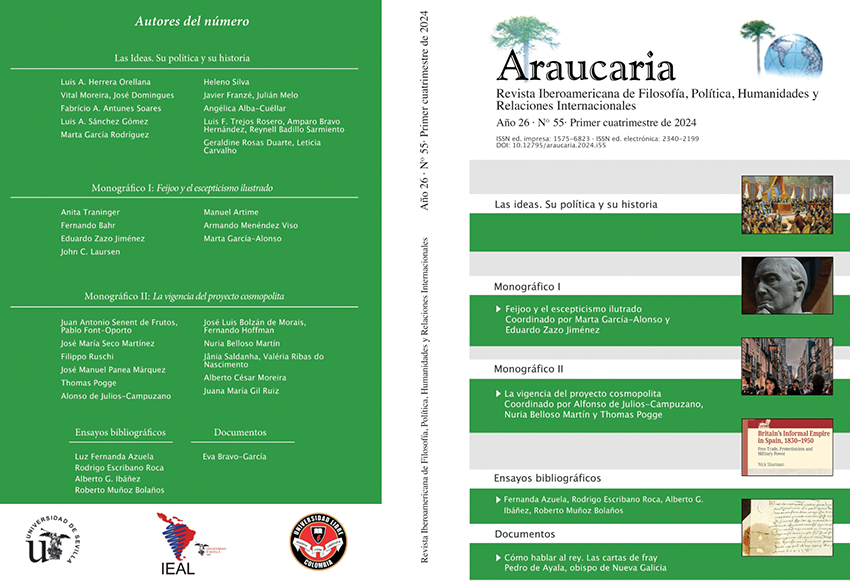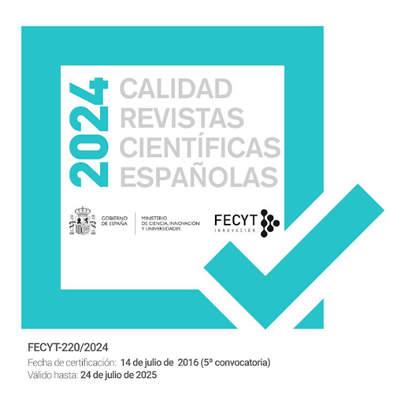Encapsular la filosofía en la academia: relato de un ascenso social y una caída epistémica
Enclosing Philosophy in Academia: A Tale of Social Glory and Epistemic Fall
DOI:
https://doi.org/10.12795/araucaria.2024.i55.05Keywords:
Universidad, Kant, Humboldt, Academia, MetafilosofíaAbstract
In the past decades, philosophy has devoted itself to metaphilosophical concerns. Despite the theoretical relevance of philosophy turning its own activity into its main subject matter, it is of great interest to track the social context in which this trend emerges: academia. In order to shed light over the reasons and motivations for this deviation, this paper analyses the foundation of Philosophy as a High Faculty through the Humboldt reform of the German University. Following a social and historical analysis, it states that the contemporary metaphilosophical questioning can be understood as an endogenous consequence of the specialization of knowledge and the development of professional philosophy.
Downloads
Metrics
References
Adorno, Theodor W. (1962), «Wozu noch Philosophie?». Merkur 16 (11), pp. 1001-11.
Arana, Juan (2015), El proceso histórico de separación entre ciencia y filosofía, Madrid, Real Academia de las Ciencias Morales y Políticas.
Bayen, Maurice (1978), Historia de las universidades, Barcelona, Oikos.
Bueno, Gustavo (1970), El papel de la filosofía en el conjunto del saber, Madrid, Ciencia Nueva.
Collins, Randall (1998), The Sociology of Philosophies: A Global Theory of Intellectual Change, Harvard University Press.
Derrida, Jacques (1983), D’un ton apocalyptique adopté naguère en philosophie, Paris, Galilée.
Fichte, Johann Gottlieb (1959), «Plan razonado para erigir en Berlín un establecimiento de enseñanza superior que esté en conexión adecuada con una academia de ciencias», en VV.AA., La idea de la universidad alemana, Buenos Aires, Editorial Sudamericana, [1807], pp. 15-115.
Garcés, Marina (2015), Filosofía inacabada, Barcelona, Galaxia Gutenberg.
García-Rodríguez, Marta (2019), «La filosofía y las “dos culturas”: ¿salvar la dicotomía?», en Antonio Casado da Rocha (ed.), Cultura dual. Nuevas identidades en la interacción universidad-sociedad, Madrid, Plaza y Valdés, pp. 119-128.
Groys, Boris (2012), Introduction to Anti-philosophy (trad. David Fernbach), New York, Verso.
Haack, Susan (2003). «The fragmentation of philosophy, the road to reintegration», Münster Lecture, <https://www.academia.edu/18875132/The_Fragmentation_of_Philosophy_the_Road_to_Reintegration_2016_> [03/08/2017].
Haack, Susan (2017), «The real question: can Philosophy be saved?», Free Inquiry, Oct/Nov 2017, pp. 40-43.
Haack, Susan (2023), «Universities‘ Research Imperative: Paying the Price for Perverse Incentives», Against Professional Philosophy, <https://againstprofphil.org/2022/09/25/a-guest-essay-by-susan-haack-universities-research-imperative-paying-the-price-for-perverse-incentives/> [20/03/2023]
Habermas, Jürgen (1971), «Wozu noch Philosophie», en Philosophisch-politische Profile, Frankfurt am Main, Suhrkamp.
Habermas, Jürgen (1987), «The idea of the university: learning processes», New German Critique, 41, pp. 3-22.
Hamlyn, David W. (1992), Being a Philosopher: The History of a Practice, London, Routledge.
Helmholtz, Hermann von (2016), «Über das Verhältniss der Naturwissenschaften zur Gesamtheit der Wissenschaft», en Philosophische und populärwissenschaftliche Schriften, Band I, Hamburg, Felix Meiner Verlag, [1862], pp. 181-217.
Helmholtz, Hermann von (1878), Über die akademische Freiheit der deutschen Universitäten, Berlin, Verlag von August Hirschwald.
Humboldt, Wilhelm von (1959), «Sobre la organización interna y externa de los establecimientos científicos superiores en Berlín», en VV.AA., La idea de la universidad alemana, Buenos Aires, Editorial Sudamericana, [1810], pp. 209-219.
Kant, Immanuel (1798), Der Streit der Fakultäten, AA VII 1-116.
Kant, Immanuel (1992), La contienda entre las facultades de filosofía y teología (trad. Roberto Rodríguez Aramayo), Madrid (CSIC), Debate.
Kant, Immanuel (1784), Beantwortung der Frage: Was ist Aufklärung?, AK VIII 33-42.
Kant, Immanuel (2004), ¿Qué es la Ilustración? Y otros escritos de ética, política y filosofía de la historia (trad. Roberto Rodríguez Aramayo), Madrid, Alianza [1784].
Lefebvre, Henri (1964), Métaphilosophie, Paris, Éditions Syllepse.
Leff, Gordon (1992), «The trivium and the three philosophies», en Hilde de Ridder-Symoens (ed.), Universities in the Middle Ages, Cambridge, Cambridge University Press, pp. 307-336.
Lübbe, Hermann (1978), Wozu Philosophie? Stellungnahmen eines Arbeitkreises, Berlin, Walter de Gruyter.
MacIntyre, Alasdair (1982), «Philosophy, the ‘other’ disciplines, and their histories: a rejoinder to Richard Rorty». Soundings: An Interdisciplinary Journal 64 (2), pp. 127-145.
Morrow, David R., y Sula, Chris Alen (2011), «Naturalized metaphilosophy», Synthese, 182, pp. 297-313.
Nudler, Óscar (2010), Filosofía de la filosofía, Madrid, Trotta.
Nussbaum, Martha (2010), Not for Profit: Why Democracy Needs the Humanities, New Jersey, Princeton University Press.
Pacho, Julián (2009), «¿Postmetafísica o postfilosofía? Una cuestión metafilosófica no sólo heideggeriana», Logos. Anales del Seminario de Metafísica, 42, pp. 123-147.
Pacho, Julián (2015), «¿Filosofía sin metafísica o final de la filosofía?» Revista Portuguesa de Filosofía, 71, 2-3, pp. 611-628.
Popper, Karl (1975), «How I see Philosophy», en Charles J. Bontempo y S. Jack Odell (eds.), The Owl of Minerva: Philosophers on Philosophy, New York, McGraw Hill, pp. 41-55.
Muguerza, Javier (1979), «Filosofía», en Miguel Ángel Quintanilla, Diccionario de filosofía contemporánea, Salamanca, Sígueme, pp. 162-183.
Rapp, Christof (2003), «Wozu Philosophie?», en Florian Keisinger (ed.), Wozu Geisteswissenschaft? Kontroverse Argumente für eine überfällige Debatte, Frankfurt am Main, Campus, pp. 85-95.
Revel, Jean-François (1957), Pourquoi des philosophes, Holland, René Julliard.
Rothblatt, Sheldon; Wittrock, Björn (1996), La Universidad europea y americana desde 1800. Las tres transformaciones de la Universidad moderna (trad. José M. Pomares), Barcelona, Ed. Pomares-Corredor.
Sacristán, Manuel (1968), Sobre el lugar de la filosofía en los estudios superiores, Barcelona, Editorial Nova Terra.
Sagal, Paul T. (1987), «Naturalistic epistemology and the harakiri of philosophy». en Abner Shimony y Debra Nails (eds.), Naturalistic Epistemology, Dordrecht, Reidel Publishing Company, pp. 321-332.
Schleiermacher, Friedrich (1959), «Pensamientos ocasionales sobre universidades en sentido alemán, con un apéndice sobre la erección de una nueva», en VV.AA., La idea de la universidad alemana, Buenos Aires, Editorial Sudamericana, [1808], pp. 117-208.
Schopenhauer, Arthur (1977), «Über die Universitätsphilosophie», en Parerga und paralipomena, kleine philosophische Schriften, Erster Band, Frankfurt am Main, Diogenes Verlag, [1851], pp. 155-218.
Suber, Peter (1993), «Is philosophy dead?», The Earlhamite, 112 (2), pp. 12-14.
Tartaglia, James (2011), «Philosophy between religion and science». Essays in Philosophy 12 (2), pp. 224-241.
Tonelli, Giorgio (1975), «The problem of the classification of sciences in Kant’s time», Rivista Critica di Storia della Filosofia 30 (3), pp. 243-294.
Downloads
Published
How to Cite
Issue
Section
License
Las ediciones impresa y electrónica de esta Revista son editadas por el Secretariado de Publicaciones de la Universidad de Sevilla, siendo necesario citar la procedencia en cualquier reproducción parcial o total.Salvo indicación contraria, todos los contenidos de la edición electrónica se distribuyen bajo una licencia de uso y distribución “Creative Commons Atribución-NoComercial-SinDerivar 4.0 Internacional”
Accepted 2023-07-08
Published 2024-02-02
- Abstract 357
- PDF (Español (España)) 205











